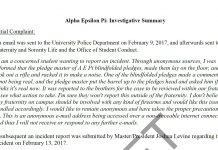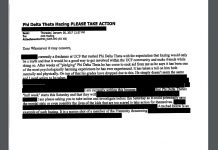UCF suffered a legal setback in its fight to impose recent fraternity hazing suspensions — even though the hazing hearings were conducted in secrecy — during a key hearing last week in an open government lawsuit filed by KnightNews.com.
KnightNews.com filed the lawsuit against President John Hitt and UCF in late February over public records disputes and to require the university’s secret hazing hearings held against organizations to be open to the public under Florida’s Sunshine Law.
When the first hearing between KnightNews.com and UCF was held on June 12, UCF went on the offensive by first trying to have the entire case thrown out and secondly trying to take President Hitt’s name off of the lawsuit in general.
But after reading extensive arguments and law cited by both sides, Judge Patricia Doherty denied UCF’s motion to dismiss the case along with the defendants’ request of taking Hitt’s name off of the lawsuit.
“I’m just going to say that I do find there is sufficient allegations in the complaint to defeat a motion to dismiss,” Doherty said.
Doherty also said she was going to issue a writ of mandamus to UCF, essentially asking them to produce the unredacted public records — including items ranging from Student Government financial information to organizational hazing allegations — KnightNews.com requested, or explain why UCF was legally allowed to withhold the records or certain portions of them.
If UCF loses the lawsuit, the university’s recent punishments issued to the Alpha Tau Omega and Sigma Chi fraternities would likely be declared void and UCF would likely have to hold the hazing hearings all over again in the public eye before punishing the fraternities. New organizational hazing hearings would also be required to be open to the public.
Sunshine Laws exist across the country and courts have explained how they’re key to a democracy.
“If an informed citizenry is to meaningfully participate in government or at least understand why government acts affecting their daily lives are taken, the process of decision making as well as the end results must be conducted in full view of the governed,” as explained by the Oklahoma Supreme Court.
Because UCF’s handling of hazing complaints is done in secrecy, students have a hard time understanding apparent discrepancies in how UCF makes decisions when receiving hazing allegations.
For example, in an investigation done by KnightNews.com, we found that UCF did not put the Lambda Theta Phi fraternity through any formal student conduct hearing process, even after a UCF employee wrote a report about the pledge he worked with. The allegations are chilling, but no emergency suspension was activated.
“I also have noticed abrasions and bleeding on him. The other day both his elbows were bleeding and scabbing. He told me that the night before the brothers made them get on the floor in plank position while their elbows rested upon dried rice…Tuesday he came into work with a large bump and open sore on his forehead the size of a half dollar,” the 2011 report stated.
A UCF spokesman said that there was no emergency suspension because “the complaint involved an anonymous victim.” However, in November, the Alpha Tau Omega fraternity was placed on a 10-day emergency suspension for anonymous hazing allegations, where less information about the victim was available.
Alpha Tau Omega members denied they committed any hazing, but the fraternity was found “in-violation” of hazing by a UCF Student Conduct Board panel behind closed doors.
KnightNews.com’s lawyer is arguing that the public has the right to be present for a hearing such as that and wants to stress that he is not taking sides of the fraternities but simply fighting for the public’s right to know.
“Now, to be candid, Your Honor, I don’t represent these fraternities or sororities. I can’t pronounce their names. And if there’s hazing going on, it probably should be punished. That’s not our concern. Our concern is that the process by which student organizations are disciplined be open to the public because we believe that this process is distinct from that process by which individual students are disciplined at the university and that that distinction makes its way from FERPA all the way through the regulations that govern the university,” attorney Justin Hemlepp said.
UCF reiterated its previous statement in response to a request for comment on this story.
“UCF is committed to complying with Florida’s important open records laws,” said Grant Heston, UCF Associate Vice President, Communications & Public Affairs. “We are also dedicated to protecting student information, as we are required to do by federal law. We will vigorously defend this case.”
The next major hearing in the KnightNews lawsuit is expected in early August, which could be key in deciding the final outcome of the case.






